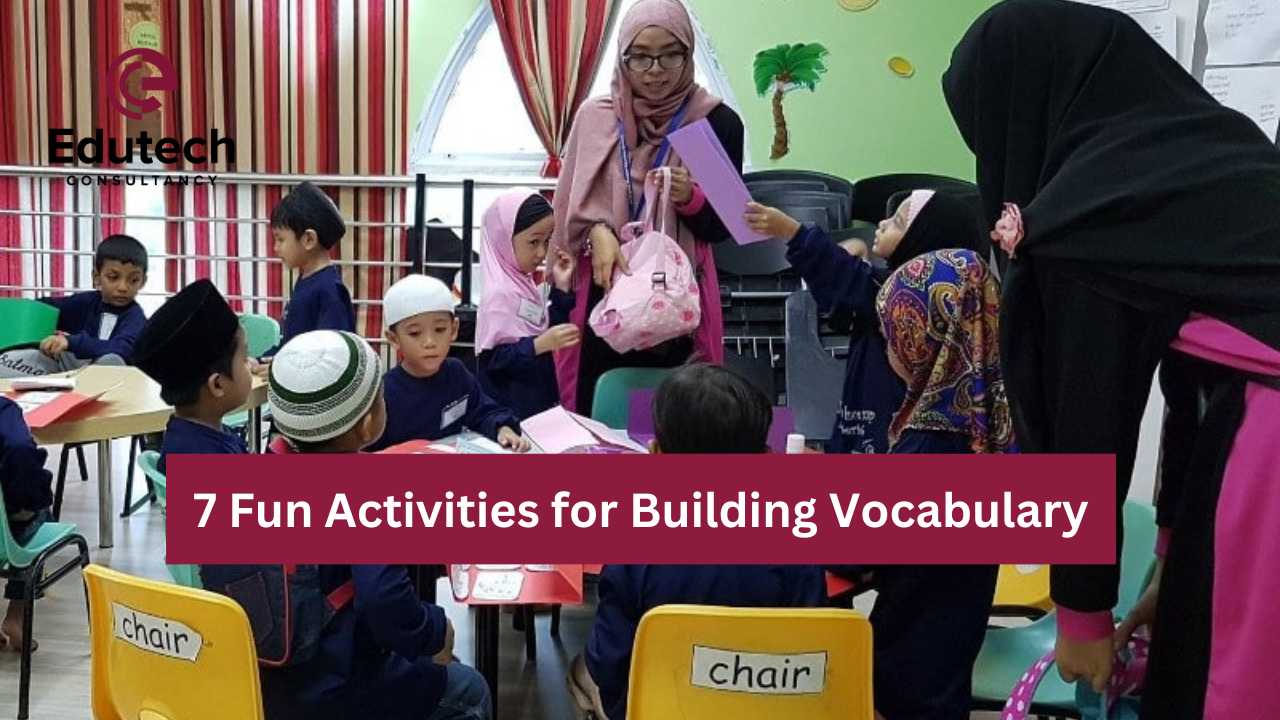For children’s growth as readers, building vocabulary is a vital part. To understand the text, students must first know their reading words. Thus, building vocabulary is compulsory for improving reading comprehension.
Incorporating fun activities into vocabulary-building programs improves engagement, knowledge of words, motivation, and the overall learning experience, increasing the likelihood that children will create a broad and diverse vocabulary over time.
So today, we will share some exciting activities to engage students and help them improve their vocabulary.

Building vocabulary with Word Charades
- To begin, divide students into two teams.
- Write words or phrases on paper slips, folding them and placing them in storage containers.
- Flip a coin to determine which team goes first, and then have the first player select a slip from the opposing team’s container.
- Players must act out what’s written on their slips without saying anything.
- The other team members must guess the word acted on by the opponent team.
Word of the Day challenge in building vocabulary
- Schedule and start the day in class with a “Word of the Day” activity.
- Teach a new word to students along with its definition and pronunciation.
- Ask your students to use that word in their conversation throughout the day.
Create a word wall
- Selecting words with students, focusing on the words from the curriculum or the current units of study.
- Design a wall in the class with colored and visible backgrounds to display the selected word.
- Add words to this wall gradually, usually 5 words per week, to make it easier for students to learn and retain.
- Encourage daily interaction with the word wall through clapping, tracing, and word-guessing games.
- These activities engage multiple senses and reinforce word meanings and spellings.
- Incorporate these words from the wall in daily learning activities, including reading and writing along with listening and speaking,
Word Building Games
- Encourage your students to participate in word-building games like Scrabble or Boggle.
- Students learn to manipulate letters, make words, and enhance vocabulary knowledge.
- This activity is easy and simple but extremely enjoyable for the students.
Play the “hot seat”
- Divide your class into two groups.
- Select one student from a group to sit in a chair with their back toward the class.
- Write a word on the board so all students except the one on the chair can see it.
- One by one, team members of the student sitting on a chair will give clues to guess the mystery word.
- Keep a timer for the guess time, and then the other team plays the same way.
Word Association
- Engage your students in this word association game to help them grow their vocabulary efficiently.
- Think and start with a word, and then each student must think of another word related to it.
- If you say Forest, then students might think and share words like trees, leaves, branches, etc.
- This activity helps develop critical thinking in students, supporting their vocabulary knowledge at the same time.
Building vocabulary with Pictionary
- Divide students into 2 teams.
- One player from each team is selected.
- The selected player draws the word on the paper after selecting from the card stack.
- Teammates try to guess the word while drawing is in progress.
- Each team earns an appointment on the correct guess.
- The game continues until the designated number of rounds is completed.
The Final words:
Isn’t building vocabulary fun?
Lastly, We hope you like the activities we shared with you, which will help you build your students’ and children’s vocabulary to new levels.
So, let’s start today and make vocabulary learning fun and energetic for students through these engaging activities. These activities will improve their vocabulary and promote a love for learning as they overcome the boring, difficult, and overwhelming learning process.
Furthermore to join more fun activities you can visit Edutech Consultancy and get enrolled in up-coming events.
FAQs
1.Why is engaging in such activities considered useful?
Engaging in exciting activities enhances motivation and memory by making the learning process enjoyable and engaging. They build a positive atmosphere and lessen the tension of traditional teaching methods.
2. Are there advantages to doing vocabulary-building activities in groups?
Indeed, engaging in group activities promotes friendship, teamwork, and healthy competition. In a group environment, word discussions and idea sharing can enhance learning and add fun to the learning process for children.
3. Can enjoyable vocabulary-building activities for learning in virtual environments be created?
Absolutely, online platforms can be used to include a lot of standard activities. Online learning education is engaging and fun, including story-telling exercises, virtual games, and quizzes.


